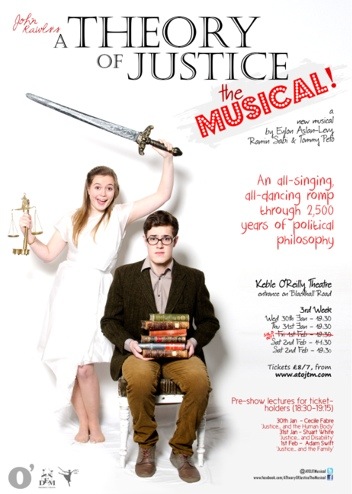Can you believe it? Some folks got together and decided to do a musical about Rawls’ political philosophy treatise, “A theory of Justice”. Yes, there actually is a musical filled with melodies about the veil of ignorance, the original position, and principles of justice. It bought me back to the day when my colleague Sophia Wong played a Rawls inspired piece for me on my piano. I love it when philosophy meets art and comedy. You can watch the trailer and purchase the online viewing experience here.
Rebecca Riley-Cooper gives us a run down of the musical at Philosophers Magazine. Here’s an excerpt:
The story follows a diffident, tweedy Professor John Rawls who – alongside the object of his desires, the beautiful but elusive Fairness – travels back in time and meets political philosophers of the past. He is pursued by his nemesis and archrival Robert Nozick, who aims to foil Rawls’s plan to write a new and groundbreaking theory of justice. Along the way, the great thinkers share their theories with Rawls in surprising and hugely comical ways: a ventriloquist Plato preaches to the masses at the agora through his dummy, Socrates; ruffian Thomas Hobbes and gentleman John Locke engage in a furious rap battle over the details of life in the state of nature; and a charmingly naïve and tender barbershop quartet of utilitarians espouse their morality of maximising happiness.
All of these scenes are so cleverly and originally interpreted that, as well as being utterly hilarious, they have real pedagogical value. As the oversensitive, childlike utilitarians sang to make themselves feel happy, and cried when hearing of someone else’s unhappiness, through my giggles I wondered why I had never thought of utilitarianism in that way before.
Given the paucity of women in the canon and the neglect of gender politics by most philosophers, I had wondered how the show would deal with this. So I was delighted to see Mary Wollstonecraft and her backing singers of Emmeline Pankhurst and Catharine Macaulay arrive to lambast the men for their disregard for women’s equality (and amused when Rawls dismissively promises to deal with the family in a later chapter).
While there were many excellent performances, for me the show was stolen by the evil libertarian duo of smooth and dastardly Nozick, played by Luke Rollason, and the terrifying dominatrix Ayn Rand, played by Clare Joyce. Their seductive and slightly deranged tango, in which Rand extols to Nozick the virtues of selfishness, was my highlight of the show. But special mention must also go to David Wigley as Rawls’s drag queen fairy mother, Immanuel Kant, who in a climactic scene worthy of a reality television montage, shows Rawls that the theory of justice he has been searching for won’t be found in the outside world; he must search within (but using his reason, and not his emotions, of course).
To create something that has both philosophical accuracy and genuine comedy is no mean feat, and yet Eylon Aslan-Levy, Ramin Sabi and Tommy Peto have somehow managed to write a script that has both, by the bucket load.
